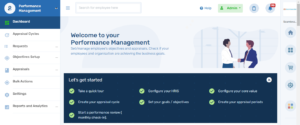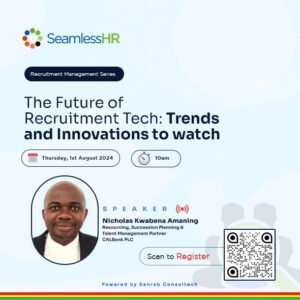Technological advancements are crucial for organisations seeking to enhance their human resource management functions.
One of the most significant developments in recent years has been the evolution of HR technology, particularly the rise of HRM systems that streamline and optimise talent acquisition processes.
This article explores the latest innovations in HR technology and how HR modules are transforming the way companies attract, hire, and retain talent.

Understanding Recruitment Technology
Recruitment Technology, also known as Recruitment Tech, refers to the broad array of tools and systems used to manage and enhance the hiring process within an organization.
These technologies encompass a wide range of applications, from the use of ATS to AI-Driven data, etc, allowing its users to efficiently manage the complex and often cumbersome recruitment lifecycle.
The aim is to automate routine tasks, reduce administrative burdens, and enhance the efficiency, effectiveness and overall experience of both recruiters and job applicants.
Evolution of Recruitment Technology
HR professionals and recruitment agencies can attest to the known fact that the recruitment industry has undergone a significant transformation over the decades, moving from traditional methods to sophisticated digital solutions.
Recruitment Technology has changed extensively since the early days and with the birth of social media and modern AI softwares, it has become even more seamless and interactive than before.
Previously, recruitment processes were highly manual and time-consuming. The primary methods included:
- Newspaper Advertisements: Employers posted job openings in newspapers, attracting local talent through mailed resumes.
- Walk-Ins and Job Fairs: Companies engage with potential candidates directly through walk-ins and job fairs.
- Networking and Referrals: Personal connections and referrals played a crucial role, though they often limited diversity.
Although these methods were effective, they were not really efficient and came with many backlogs, which will be discussed extensively at our upcoming webinar on Thursday, August 1, 2024, dubbed The Future of Recruitment Tech: Trends and Innovations to Watch.
What Are the Key Innovations in Recruitment Technology?
Gradually, recruiters are moving from the days of newspapers and other traditional methods of job postings to the new recruitment phase, which is driven by technology.
These innovations are reshaping the way organizations attract, evaluate, and hire talent. Some of them include:
1. Applicant Tracking Systems (ATS)
This system has changed the recruitment process by automating many aspects of the hiring process.
Modern ATS platforms come with enhanced features like advanced search filters and keyword optimization, making it easier to sift through large volumes of resumes.
Additionally, integration with job boards and social media channels ensures that job postings reach a wider audience, optimizing the candidate pool.
2. AI and Machine Learning
The introduction of Artificial Intelligence (AI) and machine learning into the Recruitment process has been a game-changer for recruiters and talent seekers.
AI-driven resume screening and candidate matching tools can automate the initial stages of recruitment by parsing and ranking resumes based on predefined criteria.
Predictive analytics also further refines the hiring process by analyzing data to forecast candidate success and retention, helping recruiters make more informed decisions.
Several of these innovations will be highlighted by Nicholas Kwabena Amaning, the Resourcing, Succession Planning and Talent Management Partner at CalBank PLC
What Are Human Resource Management System Modules?
Human Resource Management System (HRMS) modules are specialized software components of a dedicated software system designed to handle various aspects of HR management within an organization.
These modules help facilitate HR processes, improve efficiency, and enhance overall employee management. Here’s a breakdown of common HR modules and their functions:
1. Employee Onboarding Module
Employee Onboarding is designed to facilitate the smooth integration of new hires into the organization. This process ensures that new employees understand their roles, the company culture, and the available resources.
It also includes the use of digital paperwork, which allows new hires to complete necessary forms and documents electronically, thereby reducing paperwork-related delays and errors.
Orientation programs are another key feature, introducing new employees to the company’s values, mission, and operational procedures through structured sessions, presentations, and tours.
2. Performance Management System
The Performance Management module system is very important for overseeing and improving employee performance and development.
This module ensures that individual goals align with the organization’s strategic objectives, so every employee contributes to the company’s success.
It starts with setting clear, measurable goals for each employee, helping them understand what is expected and how their work fits into the company’s mission.
Regular performance reviews are conducted to assess progress, provide structured feedback, and discuss performance. These reviews often include feedback mechanisms to foster continuous, constructive communication between employees and managers.
Another key feature of performance management is performance tracking, and this will be discussed in detail in the upcoming webinar on Thursday, August 1, 2024, by Nicholas Kwabena Amaning.

How Do HR Recruitment Modules and Technology Transform Talent Acquisition?
Recruitment modules and technology are changing talent acquisition by introducing advanced tools and systems that simplify and enhance the hiring process. Here’s how these innovations are transforming talent acquisition:
- Automation of Routine Tasks: Recruitment technology automates many repetitive tasks involved in the hiring process, such as posting job advertisements, screening resumes, and scheduling interviews. This automation reduces the time and effort required from HR professionals, allowing them to focus on more strategic aspects of recruitment.
- Enhanced Candidate Sourcing: Advanced recruitment tools utilize AI and machine learning algorithms to source candidates from a variety of platforms, including job boards, social media, and professional networks.
These tools can analyze large volumes of data to identify and attract top talent more efficiently than traditional methods.
- Improved Candidate Screening: Recruitment modules equipped with AI-powered screening tools can evaluate resumes and applications quickly, identifying candidates who best match the job requirements.
- Data-Driven Insights: Recruitment technology provides valuable analytics and reporting features that offer insights into the effectiveness of various recruitment strategies
Future Trends and Predictions
Future trends in recruitment technology and HR recruitment modules are set to focus on greater integration of artificial intelligence and machine learning, enhancing predictive analytics for better hiring decisions.
The automation of the HR module software will improve the process further and eventually reduce manual tasks as well as improve efficiency. Additionally, advanced tools will offer more personalized candidate experiences and sophisticated data analytics.
As remote work continues to evolve, recruitment technology will adapt to support virtual hiring and global talent acquisition. The future of recruitment technology is promising, with emerging innovations such as advanced AI algorithms and blockchain for secure data management on the horizon that are expected to enhance the efficiency and effectiveness of talent acquisition.
In summary
Innovations in HR recruitment modules and technology are transforming talent acquisition by increasing efficiency, enhancing candidate experiences, and enabling data-driven decision-making.
Staying updated on these trends and advancements is crucial for organizations aiming to attract and retain top talent in today’s competitive job market.
Click this link to join this educational webinar, “The Future of Recruitment Tech: Trends and Innovations to Watch,” featuring Nicholas Kwabena Amaning, Resourcing, Succession Planning, and Talent Management Partner at CalBank PLC.



